Construction Law: Contractual Obligations and Responsibilities
VerifiedAdded on 2021/09/14
|32
|5981
|214
Report
AI Summary
This report provides a comprehensive analysis of construction law contracts, focusing on key clauses and obligations within the framework of New Zealand law. The report begins with an introduction to construction contracts, defining the agreement between contractors and employers. It then delves into specific clauses concerning law, currency, and language, emphasizing the use of English and New Zealand currency. Various contract types, including lump sum and measure and value contracts, are examined, highlighting their respective pricing and adjustment mechanisms. The report also covers the roles and responsibilities of the engineer, contractor, and subcontractors, including obligations related to bonds, site care, property protection, and setting out. Furthermore, it addresses the roles of the engineer and the engineer's representative, their powers, and responsibilities in overseeing the contract work, including inspection, recording, measuring, and testing of materials. Overall, the report provides a detailed overview of construction contract components, essential for understanding the legal and practical aspects of construction projects.
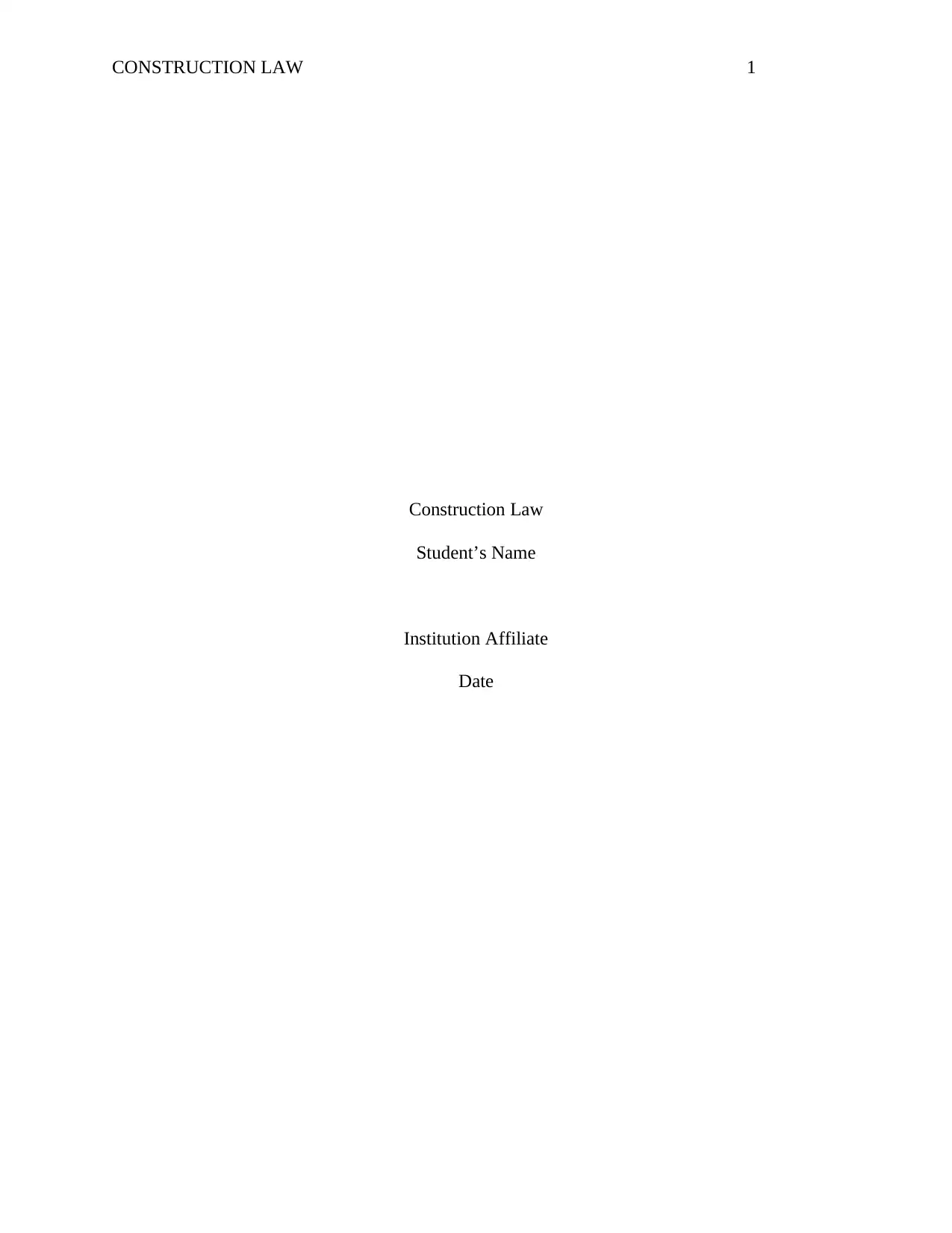
CONSTRUCTION LAW 1
Construction Law
Student’s Name
Institution Affiliate
Date
Construction Law
Student’s Name
Institution Affiliate
Date
Paraphrase This Document
Need a fresh take? Get an instant paraphrase of this document with our AI Paraphraser
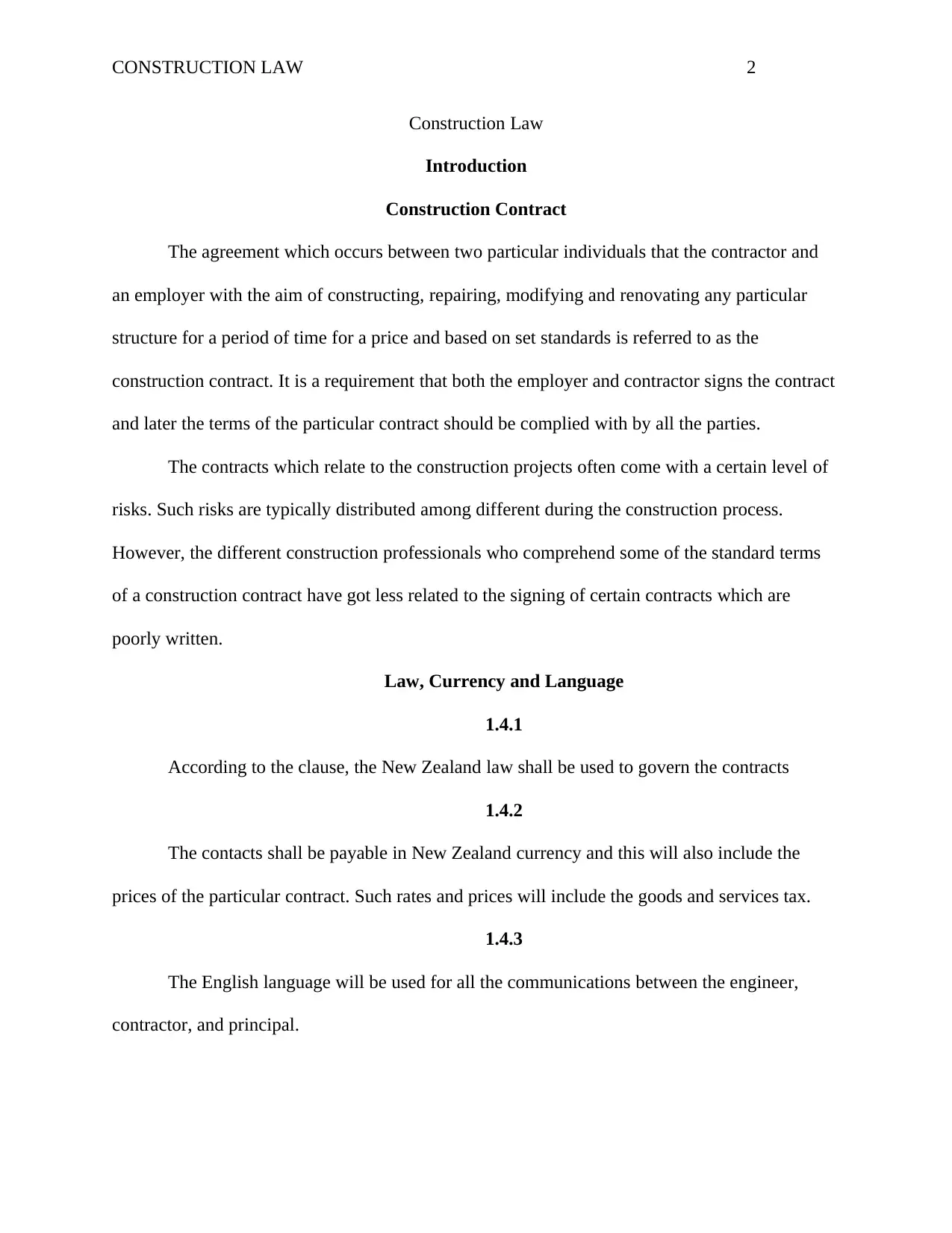
CONSTRUCTION LAW 2
Construction Law
Introduction
Construction Contract
The agreement which occurs between two particular individuals that the contractor and
an employer with the aim of constructing, repairing, modifying and renovating any particular
structure for a period of time for a price and based on set standards is referred to as the
construction contract. It is a requirement that both the employer and contractor signs the contract
and later the terms of the particular contract should be complied with by all the parties.
The contracts which relate to the construction projects often come with a certain level of
risks. Such risks are typically distributed among different during the construction process.
However, the different construction professionals who comprehend some of the standard terms
of a construction contract have got less related to the signing of certain contracts which are
poorly written.
Law, Currency and Language
1.4.1
According to the clause, the New Zealand law shall be used to govern the contracts
1.4.2
The contacts shall be payable in New Zealand currency and this will also include the
prices of the particular contract. Such rates and prices will include the goods and services tax.
1.4.3
The English language will be used for all the communications between the engineer,
contractor, and principal.
Construction Law
Introduction
Construction Contract
The agreement which occurs between two particular individuals that the contractor and
an employer with the aim of constructing, repairing, modifying and renovating any particular
structure for a period of time for a price and based on set standards is referred to as the
construction contract. It is a requirement that both the employer and contractor signs the contract
and later the terms of the particular contract should be complied with by all the parties.
The contracts which relate to the construction projects often come with a certain level of
risks. Such risks are typically distributed among different during the construction process.
However, the different construction professionals who comprehend some of the standard terms
of a construction contract have got less related to the signing of certain contracts which are
poorly written.
Law, Currency and Language
1.4.1
According to the clause, the New Zealand law shall be used to govern the contracts
1.4.2
The contacts shall be payable in New Zealand currency and this will also include the
prices of the particular contract. Such rates and prices will include the goods and services tax.
1.4.3
The English language will be used for all the communications between the engineer,
contractor, and principal.
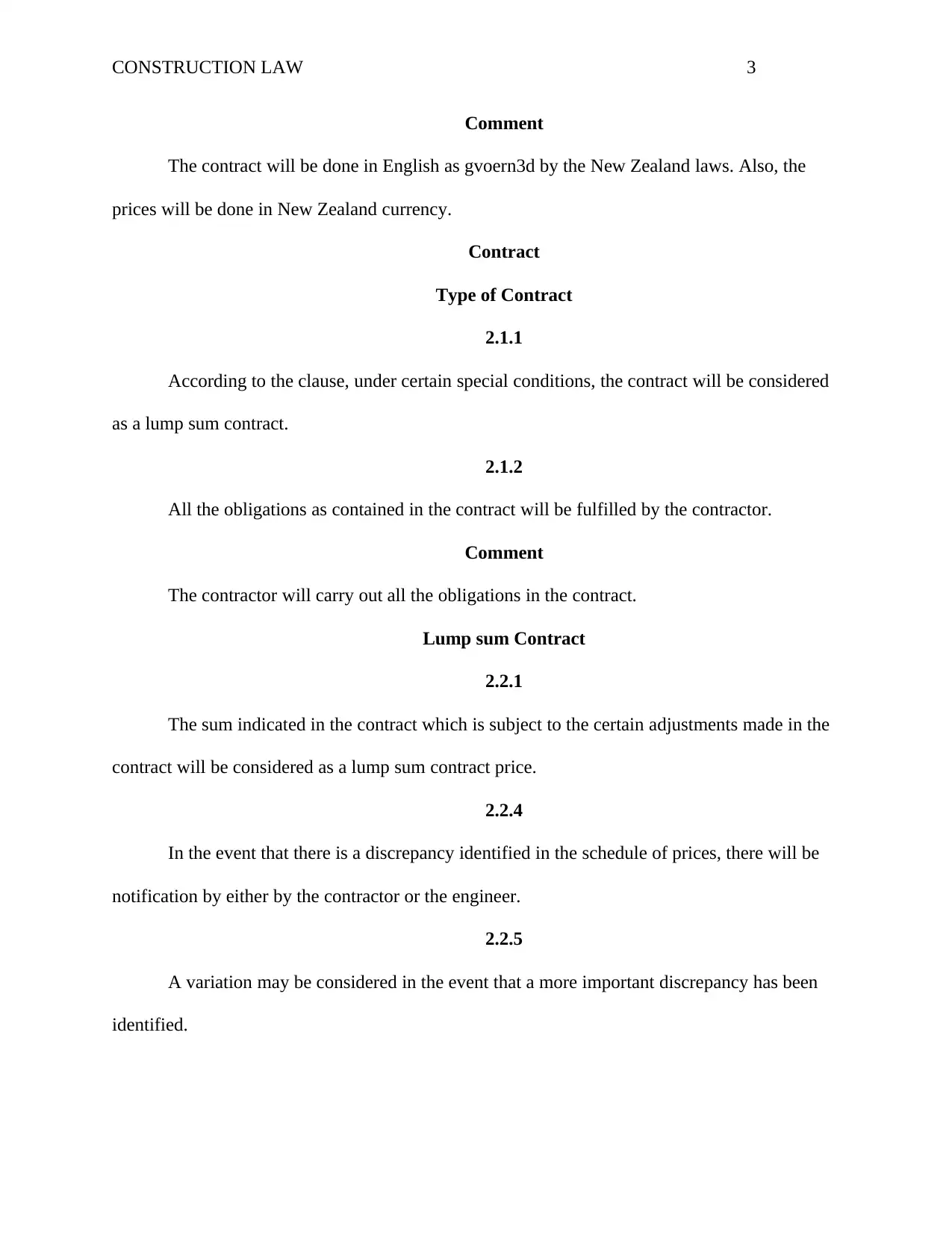
CONSTRUCTION LAW 3
Comment
The contract will be done in English as gvoern3d by the New Zealand laws. Also, the
prices will be done in New Zealand currency.
Contract
Type of Contract
2.1.1
According to the clause, under certain special conditions, the contract will be considered
as a lump sum contract.
2.1.2
All the obligations as contained in the contract will be fulfilled by the contractor.
Comment
The contractor will carry out all the obligations in the contract.
Lump sum Contract
2.2.1
The sum indicated in the contract which is subject to the certain adjustments made in the
contract will be considered as a lump sum contract price.
2.2.4
In the event that there is a discrepancy identified in the schedule of prices, there will be
notification by either by the contractor or the engineer.
2.2.5
A variation may be considered in the event that a more important discrepancy has been
identified.
Comment
The contract will be done in English as gvoern3d by the New Zealand laws. Also, the
prices will be done in New Zealand currency.
Contract
Type of Contract
2.1.1
According to the clause, under certain special conditions, the contract will be considered
as a lump sum contract.
2.1.2
All the obligations as contained in the contract will be fulfilled by the contractor.
Comment
The contractor will carry out all the obligations in the contract.
Lump sum Contract
2.2.1
The sum indicated in the contract which is subject to the certain adjustments made in the
contract will be considered as a lump sum contract price.
2.2.4
In the event that there is a discrepancy identified in the schedule of prices, there will be
notification by either by the contractor or the engineer.
2.2.5
A variation may be considered in the event that a more important discrepancy has been
identified.
⊘ This is a preview!⊘
Do you want full access?
Subscribe today to unlock all pages.

Trusted by 1+ million students worldwide
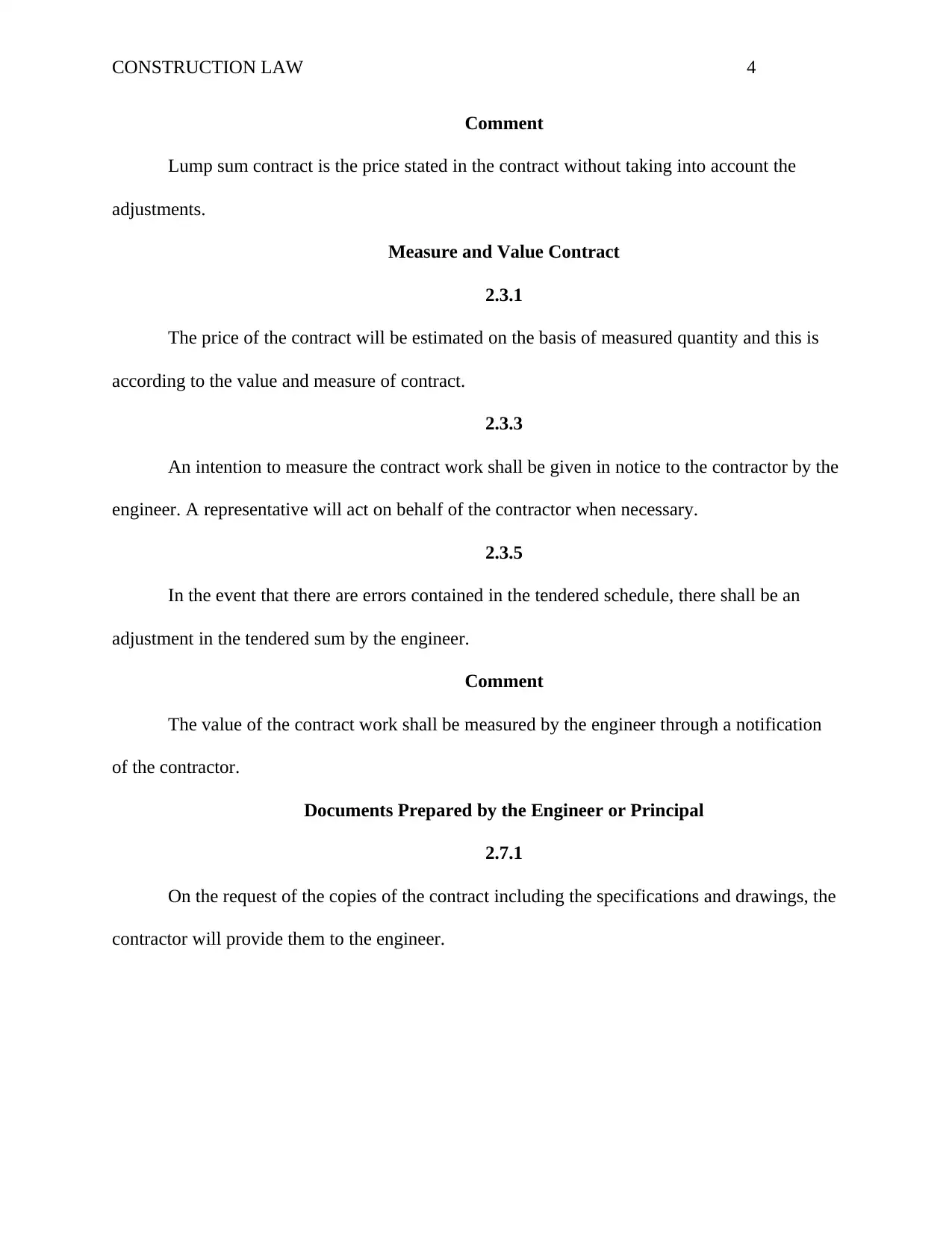
CONSTRUCTION LAW 4
Comment
Lump sum contract is the price stated in the contract without taking into account the
adjustments.
Measure and Value Contract
2.3.1
The price of the contract will be estimated on the basis of measured quantity and this is
according to the value and measure of contract.
2.3.3
An intention to measure the contract work shall be given in notice to the contractor by the
engineer. A representative will act on behalf of the contractor when necessary.
2.3.5
In the event that there are errors contained in the tendered schedule, there shall be an
adjustment in the tendered sum by the engineer.
Comment
The value of the contract work shall be measured by the engineer through a notification
of the contractor.
Documents Prepared by the Engineer or Principal
2.7.1
On the request of the copies of the contract including the specifications and drawings, the
contractor will provide them to the engineer.
Comment
Lump sum contract is the price stated in the contract without taking into account the
adjustments.
Measure and Value Contract
2.3.1
The price of the contract will be estimated on the basis of measured quantity and this is
according to the value and measure of contract.
2.3.3
An intention to measure the contract work shall be given in notice to the contractor by the
engineer. A representative will act on behalf of the contractor when necessary.
2.3.5
In the event that there are errors contained in the tendered schedule, there shall be an
adjustment in the tendered sum by the engineer.
Comment
The value of the contract work shall be measured by the engineer through a notification
of the contractor.
Documents Prepared by the Engineer or Principal
2.7.1
On the request of the copies of the contract including the specifications and drawings, the
contractor will provide them to the engineer.
Paraphrase This Document
Need a fresh take? Get an instant paraphrase of this document with our AI Paraphraser
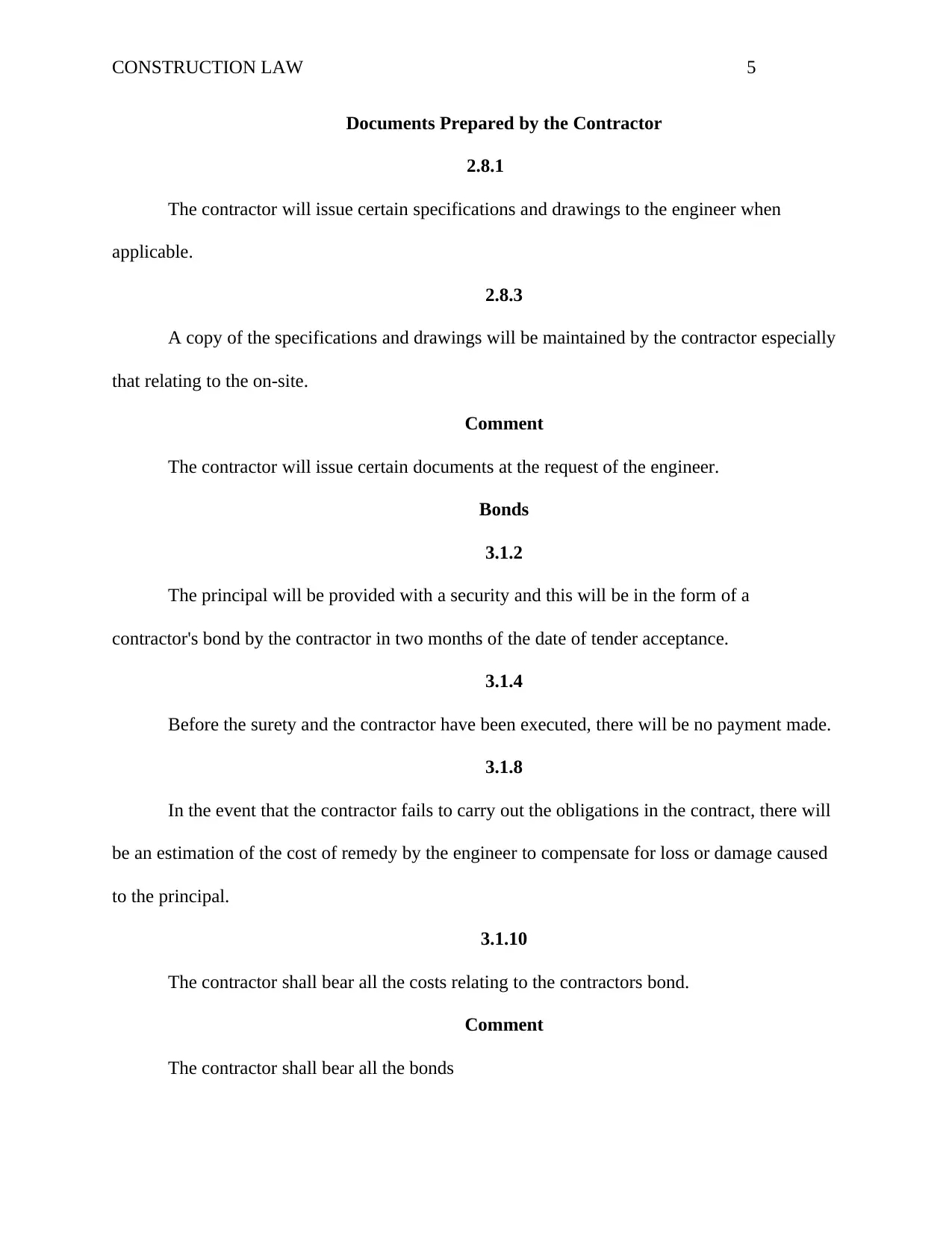
CONSTRUCTION LAW 5
Documents Prepared by the Contractor
2.8.1
The contractor will issue certain specifications and drawings to the engineer when
applicable.
2.8.3
A copy of the specifications and drawings will be maintained by the contractor especially
that relating to the on-site.
Comment
The contractor will issue certain documents at the request of the engineer.
Bonds
3.1.2
The principal will be provided with a security and this will be in the form of a
contractor's bond by the contractor in two months of the date of tender acceptance.
3.1.4
Before the surety and the contractor have been executed, there will be no payment made.
3.1.8
In the event that the contractor fails to carry out the obligations in the contract, there will
be an estimation of the cost of remedy by the engineer to compensate for loss or damage caused
to the principal.
3.1.10
The contractor shall bear all the costs relating to the contractors bond.
Comment
The contractor shall bear all the bonds
Documents Prepared by the Contractor
2.8.1
The contractor will issue certain specifications and drawings to the engineer when
applicable.
2.8.3
A copy of the specifications and drawings will be maintained by the contractor especially
that relating to the on-site.
Comment
The contractor will issue certain documents at the request of the engineer.
Bonds
3.1.2
The principal will be provided with a security and this will be in the form of a
contractor's bond by the contractor in two months of the date of tender acceptance.
3.1.4
Before the surety and the contractor have been executed, there will be no payment made.
3.1.8
In the event that the contractor fails to carry out the obligations in the contract, there will
be an estimation of the cost of remedy by the engineer to compensate for loss or damage caused
to the principal.
3.1.10
The contractor shall bear all the costs relating to the contractors bond.
Comment
The contractor shall bear all the bonds
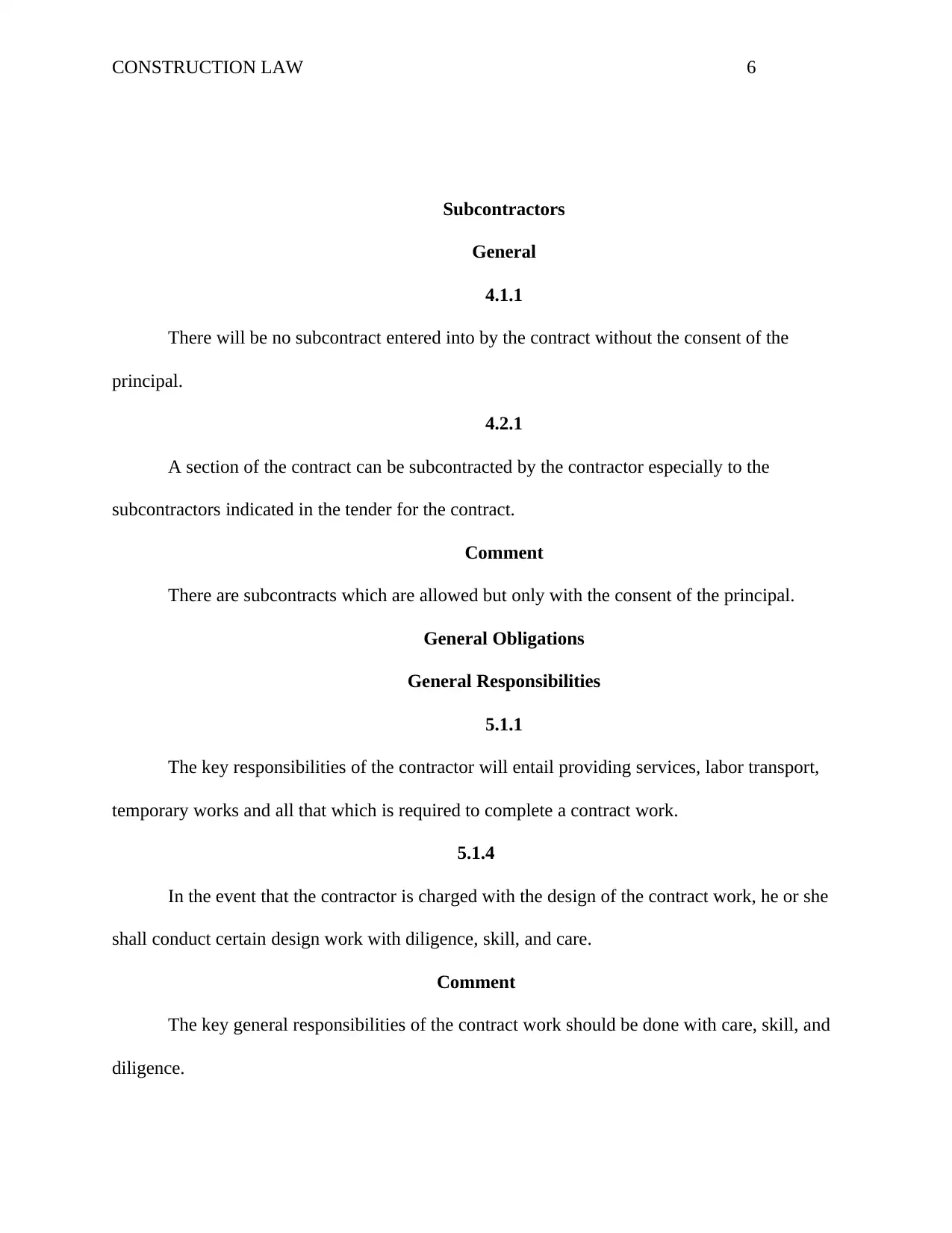
CONSTRUCTION LAW 6
Subcontractors
General
4.1.1
There will be no subcontract entered into by the contract without the consent of the
principal.
4.2.1
A section of the contract can be subcontracted by the contractor especially to the
subcontractors indicated in the tender for the contract.
Comment
There are subcontracts which are allowed but only with the consent of the principal.
General Obligations
General Responsibilities
5.1.1
The key responsibilities of the contractor will entail providing services, labor transport,
temporary works and all that which is required to complete a contract work.
5.1.4
In the event that the contractor is charged with the design of the contract work, he or she
shall conduct certain design work with diligence, skill, and care.
Comment
The key general responsibilities of the contract work should be done with care, skill, and
diligence.
Subcontractors
General
4.1.1
There will be no subcontract entered into by the contract without the consent of the
principal.
4.2.1
A section of the contract can be subcontracted by the contractor especially to the
subcontractors indicated in the tender for the contract.
Comment
There are subcontracts which are allowed but only with the consent of the principal.
General Obligations
General Responsibilities
5.1.1
The key responsibilities of the contractor will entail providing services, labor transport,
temporary works and all that which is required to complete a contract work.
5.1.4
In the event that the contractor is charged with the design of the contract work, he or she
shall conduct certain design work with diligence, skill, and care.
Comment
The key general responsibilities of the contract work should be done with care, skill, and
diligence.
⊘ This is a preview!⊘
Do you want full access?
Subscribe today to unlock all pages.

Trusted by 1+ million students worldwide
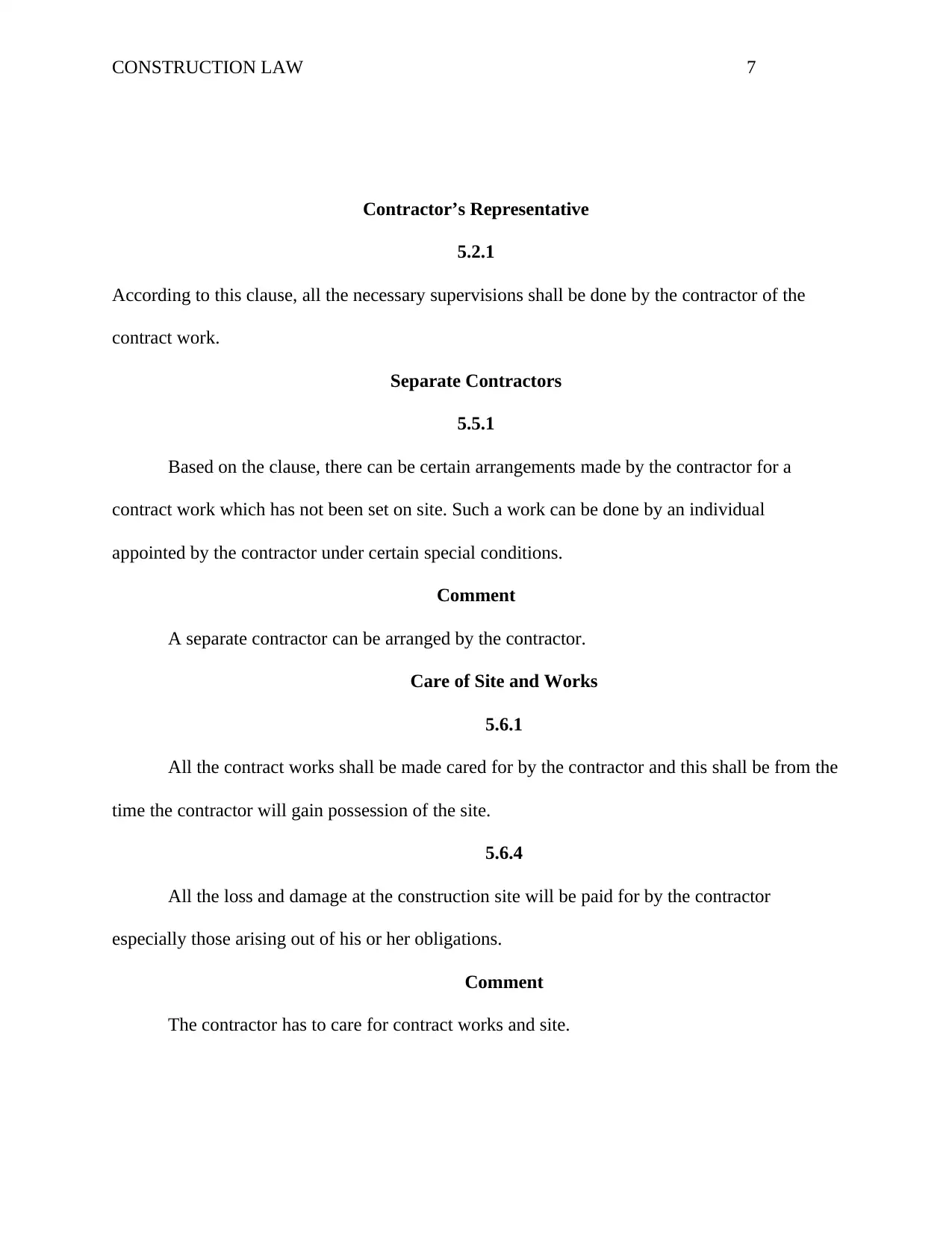
CONSTRUCTION LAW 7
Contractor’s Representative
5.2.1
According to this clause, all the necessary supervisions shall be done by the contractor of the
contract work.
Separate Contractors
5.5.1
Based on the clause, there can be certain arrangements made by the contractor for a
contract work which has not been set on site. Such a work can be done by an individual
appointed by the contractor under certain special conditions.
Comment
A separate contractor can be arranged by the contractor.
Care of Site and Works
5.6.1
All the contract works shall be made cared for by the contractor and this shall be from the
time the contractor will gain possession of the site.
5.6.4
All the loss and damage at the construction site will be paid for by the contractor
especially those arising out of his or her obligations.
Comment
The contractor has to care for contract works and site.
Contractor’s Representative
5.2.1
According to this clause, all the necessary supervisions shall be done by the contractor of the
contract work.
Separate Contractors
5.5.1
Based on the clause, there can be certain arrangements made by the contractor for a
contract work which has not been set on site. Such a work can be done by an individual
appointed by the contractor under certain special conditions.
Comment
A separate contractor can be arranged by the contractor.
Care of Site and Works
5.6.1
All the contract works shall be made cared for by the contractor and this shall be from the
time the contractor will gain possession of the site.
5.6.4
All the loss and damage at the construction site will be paid for by the contractor
especially those arising out of his or her obligations.
Comment
The contractor has to care for contract works and site.
Paraphrase This Document
Need a fresh take? Get an instant paraphrase of this document with our AI Paraphraser
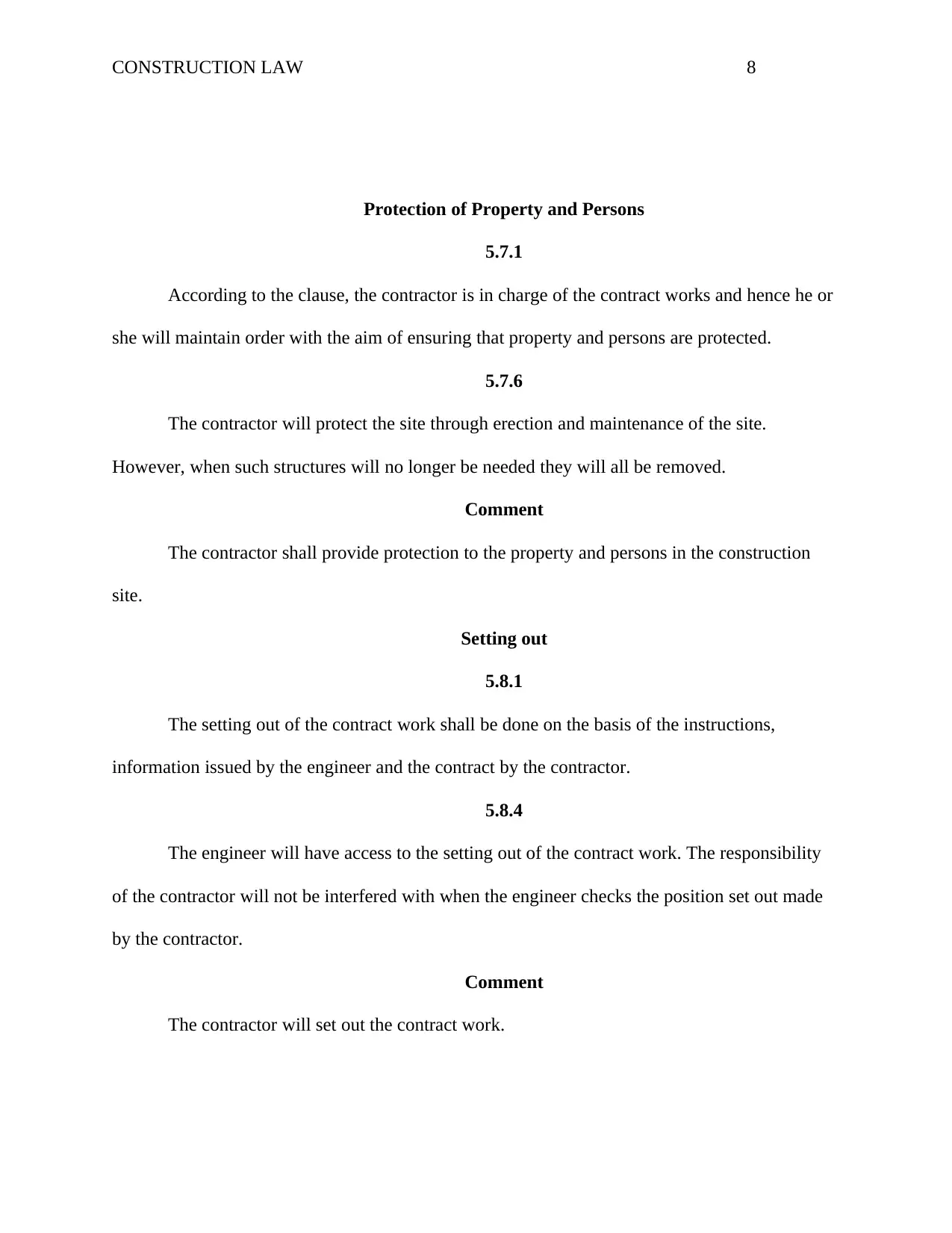
CONSTRUCTION LAW 8
Protection of Property and Persons
5.7.1
According to the clause, the contractor is in charge of the contract works and hence he or
she will maintain order with the aim of ensuring that property and persons are protected.
5.7.6
The contractor will protect the site through erection and maintenance of the site.
However, when such structures will no longer be needed they will all be removed.
Comment
The contractor shall provide protection to the property and persons in the construction
site.
Setting out
5.8.1
The setting out of the contract work shall be done on the basis of the instructions,
information issued by the engineer and the contract by the contractor.
5.8.4
The engineer will have access to the setting out of the contract work. The responsibility
of the contractor will not be interfered with when the engineer checks the position set out made
by the contractor.
Comment
The contractor will set out the contract work.
Protection of Property and Persons
5.7.1
According to the clause, the contractor is in charge of the contract works and hence he or
she will maintain order with the aim of ensuring that property and persons are protected.
5.7.6
The contractor will protect the site through erection and maintenance of the site.
However, when such structures will no longer be needed they will all be removed.
Comment
The contractor shall provide protection to the property and persons in the construction
site.
Setting out
5.8.1
The setting out of the contract work shall be done on the basis of the instructions,
information issued by the engineer and the contract by the contractor.
5.8.4
The engineer will have access to the setting out of the contract work. The responsibility
of the contractor will not be interfered with when the engineer checks the position set out made
by the contractor.
Comment
The contractor will set out the contract work.
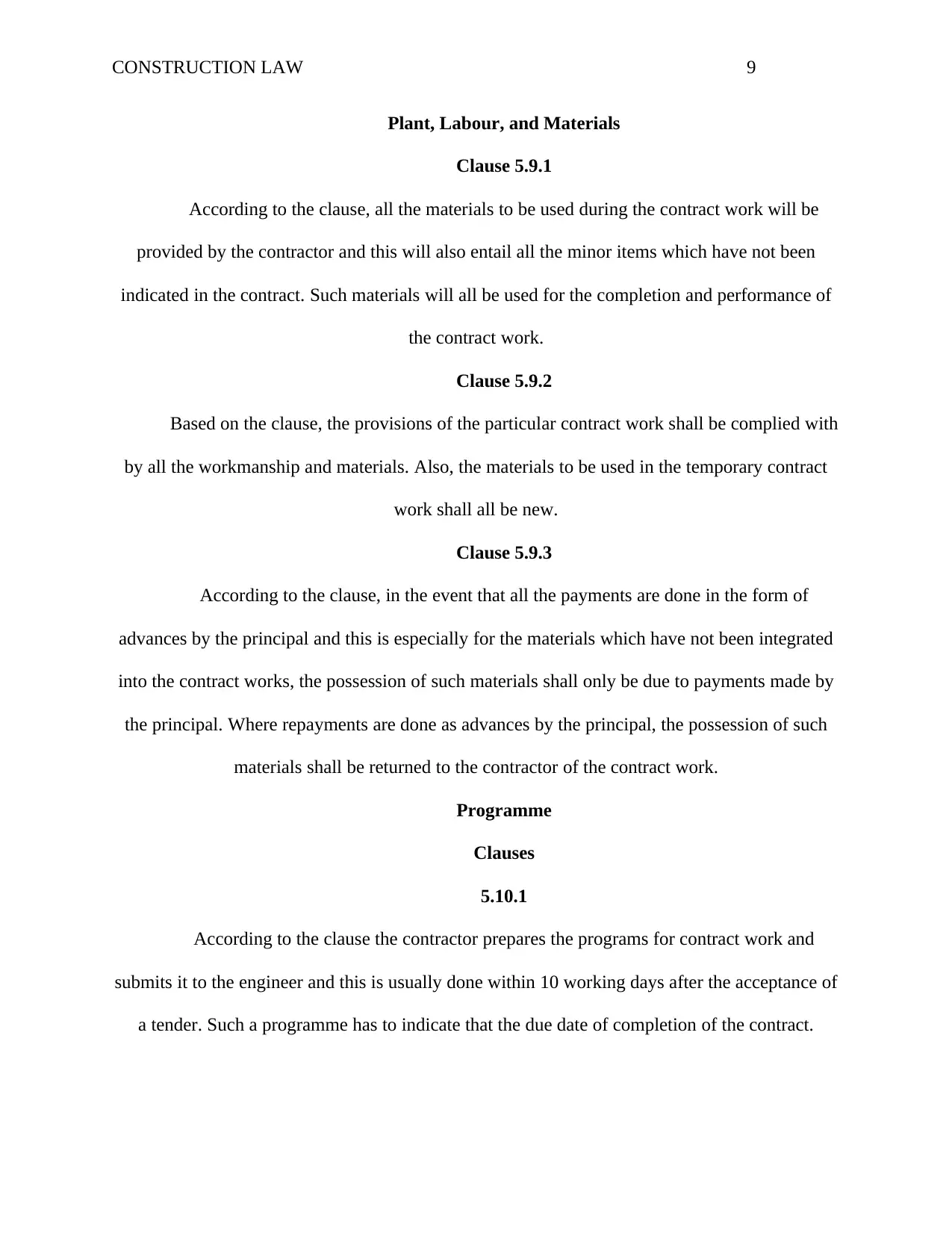
CONSTRUCTION LAW 9
Plant, Labour, and Materials
Clause 5.9.1
According to the clause, all the materials to be used during the contract work will be
provided by the contractor and this will also entail all the minor items which have not been
indicated in the contract. Such materials will all be used for the completion and performance of
the contract work.
Clause 5.9.2
Based on the clause, the provisions of the particular contract work shall be complied with
by all the workmanship and materials. Also, the materials to be used in the temporary contract
work shall all be new.
Clause 5.9.3
According to the clause, in the event that all the payments are done in the form of
advances by the principal and this is especially for the materials which have not been integrated
into the contract works, the possession of such materials shall only be due to payments made by
the principal. Where repayments are done as advances by the principal, the possession of such
materials shall be returned to the contractor of the contract work.
Programme
Clauses
5.10.1
According to the clause the contractor prepares the programs for contract work and
submits it to the engineer and this is usually done within 10 working days after the acceptance of
a tender. Such a programme has to indicate that the due date of completion of the contract.
Plant, Labour, and Materials
Clause 5.9.1
According to the clause, all the materials to be used during the contract work will be
provided by the contractor and this will also entail all the minor items which have not been
indicated in the contract. Such materials will all be used for the completion and performance of
the contract work.
Clause 5.9.2
Based on the clause, the provisions of the particular contract work shall be complied with
by all the workmanship and materials. Also, the materials to be used in the temporary contract
work shall all be new.
Clause 5.9.3
According to the clause, in the event that all the payments are done in the form of
advances by the principal and this is especially for the materials which have not been integrated
into the contract works, the possession of such materials shall only be due to payments made by
the principal. Where repayments are done as advances by the principal, the possession of such
materials shall be returned to the contractor of the contract work.
Programme
Clauses
5.10.1
According to the clause the contractor prepares the programs for contract work and
submits it to the engineer and this is usually done within 10 working days after the acceptance of
a tender. Such a programme has to indicate that the due date of completion of the contract.
⊘ This is a preview!⊘
Do you want full access?
Subscribe today to unlock all pages.

Trusted by 1+ million students worldwide
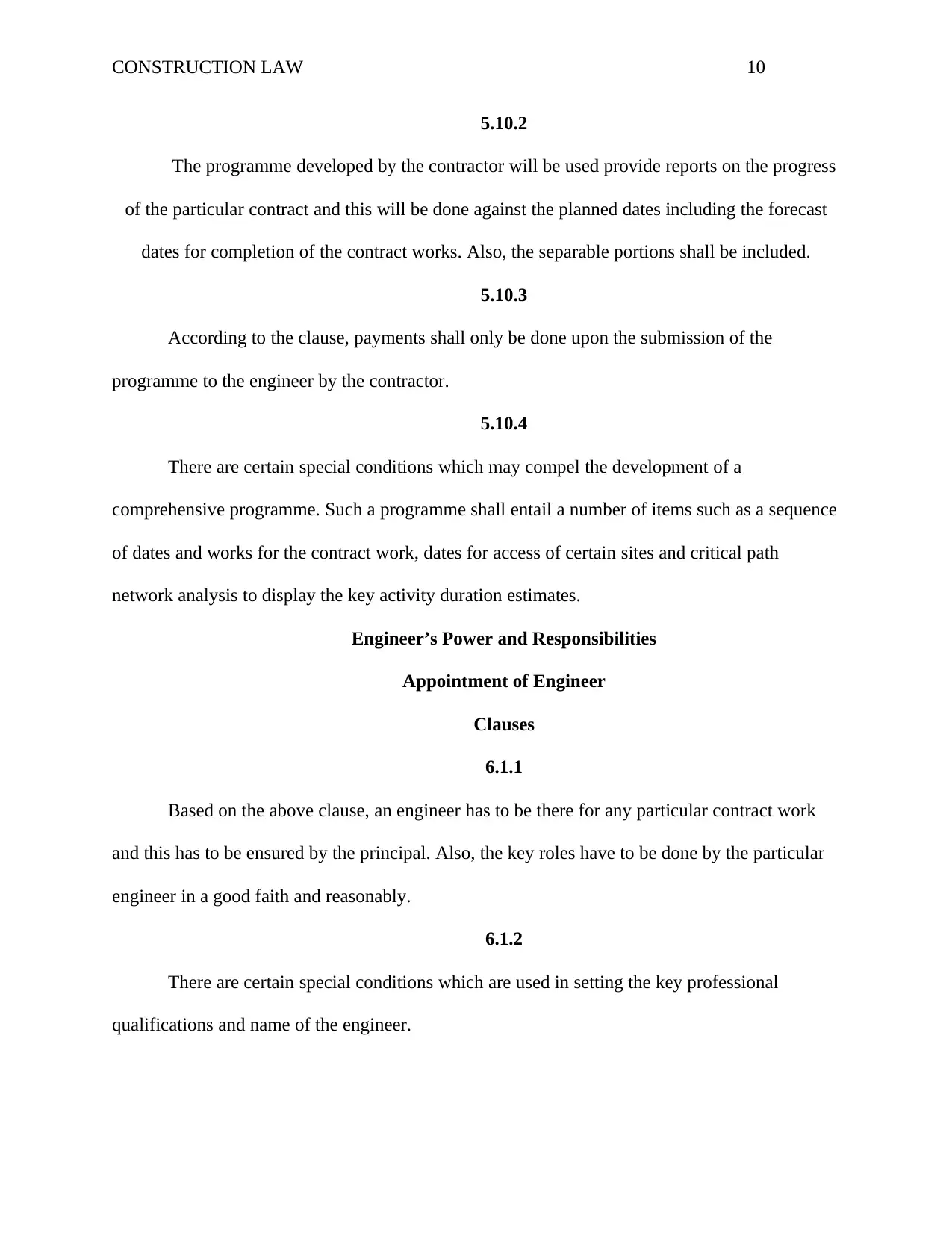
CONSTRUCTION LAW 10
5.10.2
The programme developed by the contractor will be used provide reports on the progress
of the particular contract and this will be done against the planned dates including the forecast
dates for completion of the contract works. Also, the separable portions shall be included.
5.10.3
According to the clause, payments shall only be done upon the submission of the
programme to the engineer by the contractor.
5.10.4
There are certain special conditions which may compel the development of a
comprehensive programme. Such a programme shall entail a number of items such as a sequence
of dates and works for the contract work, dates for access of certain sites and critical path
network analysis to display the key activity duration estimates.
Engineer’s Power and Responsibilities
Appointment of Engineer
Clauses
6.1.1
Based on the above clause, an engineer has to be there for any particular contract work
and this has to be ensured by the principal. Also, the key roles have to be done by the particular
engineer in a good faith and reasonably.
6.1.2
There are certain special conditions which are used in setting the key professional
qualifications and name of the engineer.
5.10.2
The programme developed by the contractor will be used provide reports on the progress
of the particular contract and this will be done against the planned dates including the forecast
dates for completion of the contract works. Also, the separable portions shall be included.
5.10.3
According to the clause, payments shall only be done upon the submission of the
programme to the engineer by the contractor.
5.10.4
There are certain special conditions which may compel the development of a
comprehensive programme. Such a programme shall entail a number of items such as a sequence
of dates and works for the contract work, dates for access of certain sites and critical path
network analysis to display the key activity duration estimates.
Engineer’s Power and Responsibilities
Appointment of Engineer
Clauses
6.1.1
Based on the above clause, an engineer has to be there for any particular contract work
and this has to be ensured by the principal. Also, the key roles have to be done by the particular
engineer in a good faith and reasonably.
6.1.2
There are certain special conditions which are used in setting the key professional
qualifications and name of the engineer.
Paraphrase This Document
Need a fresh take? Get an instant paraphrase of this document with our AI Paraphraser
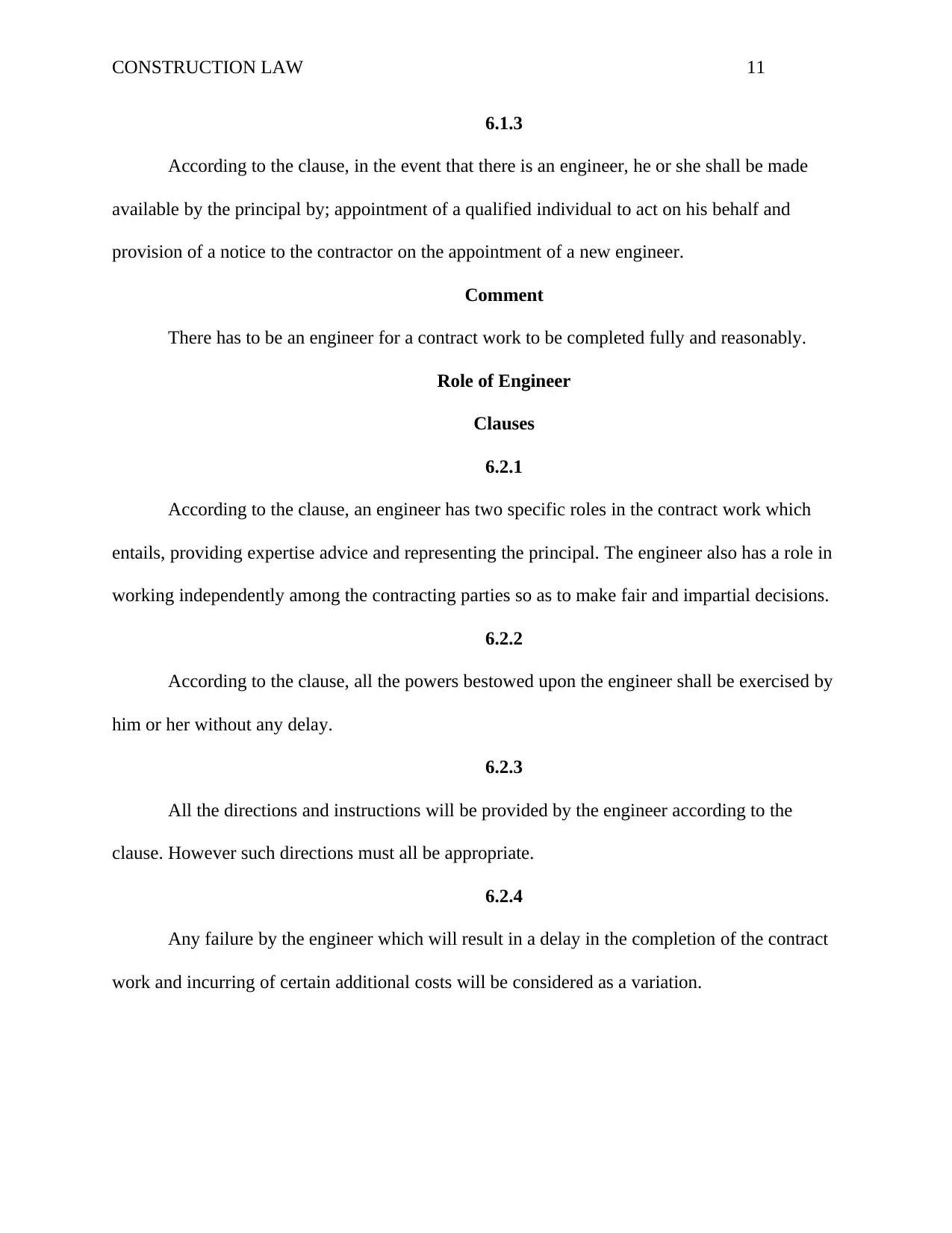
CONSTRUCTION LAW 11
6.1.3
According to the clause, in the event that there is an engineer, he or she shall be made
available by the principal by; appointment of a qualified individual to act on his behalf and
provision of a notice to the contractor on the appointment of a new engineer.
Comment
There has to be an engineer for a contract work to be completed fully and reasonably.
Role of Engineer
Clauses
6.2.1
According to the clause, an engineer has two specific roles in the contract work which
entails, providing expertise advice and representing the principal. The engineer also has a role in
working independently among the contracting parties so as to make fair and impartial decisions.
6.2.2
According to the clause, all the powers bestowed upon the engineer shall be exercised by
him or her without any delay.
6.2.3
All the directions and instructions will be provided by the engineer according to the
clause. However such directions must all be appropriate.
6.2.4
Any failure by the engineer which will result in a delay in the completion of the contract
work and incurring of certain additional costs will be considered as a variation.
6.1.3
According to the clause, in the event that there is an engineer, he or she shall be made
available by the principal by; appointment of a qualified individual to act on his behalf and
provision of a notice to the contractor on the appointment of a new engineer.
Comment
There has to be an engineer for a contract work to be completed fully and reasonably.
Role of Engineer
Clauses
6.2.1
According to the clause, an engineer has two specific roles in the contract work which
entails, providing expertise advice and representing the principal. The engineer also has a role in
working independently among the contracting parties so as to make fair and impartial decisions.
6.2.2
According to the clause, all the powers bestowed upon the engineer shall be exercised by
him or her without any delay.
6.2.3
All the directions and instructions will be provided by the engineer according to the
clause. However such directions must all be appropriate.
6.2.4
Any failure by the engineer which will result in a delay in the completion of the contract
work and incurring of certain additional costs will be considered as a variation.
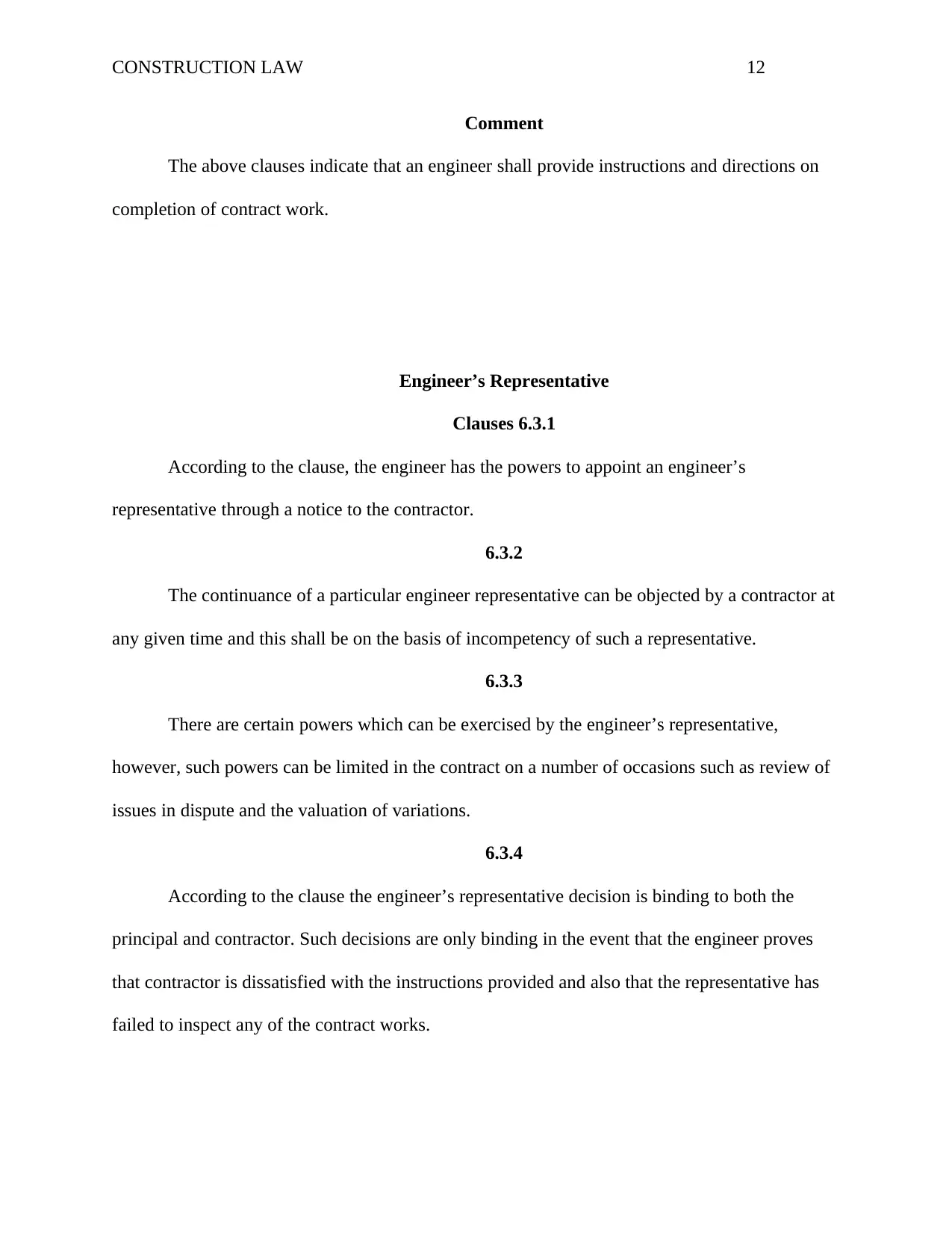
CONSTRUCTION LAW 12
Comment
The above clauses indicate that an engineer shall provide instructions and directions on
completion of contract work.
Engineer’s Representative
Clauses 6.3.1
According to the clause, the engineer has the powers to appoint an engineer’s
representative through a notice to the contractor.
6.3.2
The continuance of a particular engineer representative can be objected by a contractor at
any given time and this shall be on the basis of incompetency of such a representative.
6.3.3
There are certain powers which can be exercised by the engineer’s representative,
however, such powers can be limited in the contract on a number of occasions such as review of
issues in dispute and the valuation of variations.
6.3.4
According to the clause the engineer’s representative decision is binding to both the
principal and contractor. Such decisions are only binding in the event that the engineer proves
that contractor is dissatisfied with the instructions provided and also that the representative has
failed to inspect any of the contract works.
Comment
The above clauses indicate that an engineer shall provide instructions and directions on
completion of contract work.
Engineer’s Representative
Clauses 6.3.1
According to the clause, the engineer has the powers to appoint an engineer’s
representative through a notice to the contractor.
6.3.2
The continuance of a particular engineer representative can be objected by a contractor at
any given time and this shall be on the basis of incompetency of such a representative.
6.3.3
There are certain powers which can be exercised by the engineer’s representative,
however, such powers can be limited in the contract on a number of occasions such as review of
issues in dispute and the valuation of variations.
6.3.4
According to the clause the engineer’s representative decision is binding to both the
principal and contractor. Such decisions are only binding in the event that the engineer proves
that contractor is dissatisfied with the instructions provided and also that the representative has
failed to inspect any of the contract works.
⊘ This is a preview!⊘
Do you want full access?
Subscribe today to unlock all pages.

Trusted by 1+ million students worldwide
1 out of 32
Your All-in-One AI-Powered Toolkit for Academic Success.
+13062052269
info@desklib.com
Available 24*7 on WhatsApp / Email
![[object Object]](/_next/static/media/star-bottom.7253800d.svg)
Unlock your academic potential
Copyright © 2020–2026 A2Z Services. All Rights Reserved. Developed and managed by ZUCOL.